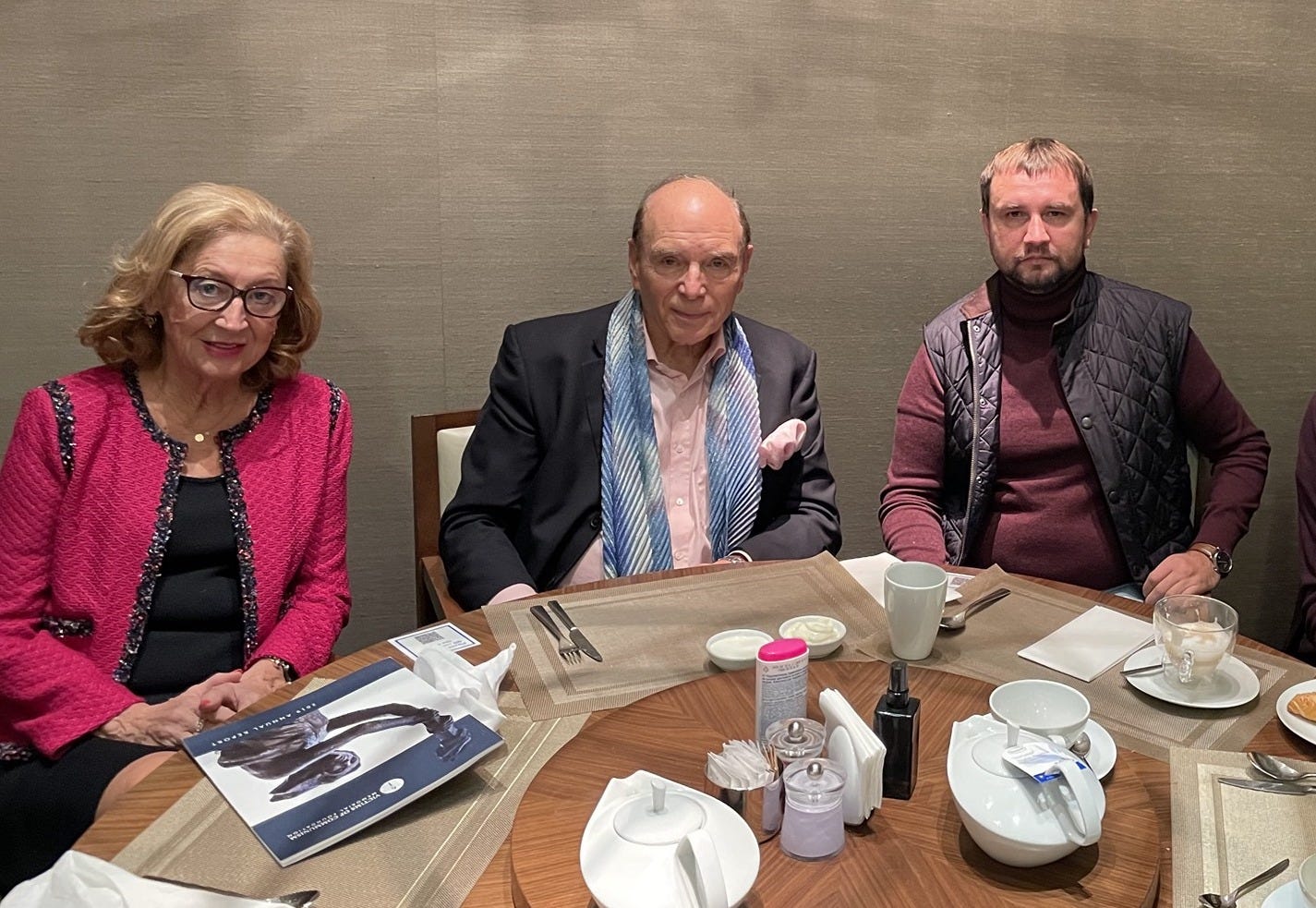The Twitter account representing the Verkhovna Rada, or Ukrainian parliament, ushered in the new year of 2023 by marking the 114th anniversary of the birth of Nazi collaborator Stepan Bandera. The since-deleted post included a selfie of the commander in chief of the Ukrainian armed forces posing with a Bandera portrait, which was previously mentioned on the “Bandera Lobby Blog.”
“I’m satisfied with the Banderization of Ukraine 🙂” said Volodymyr Viatrovych, the former director of the government’s Ukrainian Institute of National Memory (2014–19), to his 131,000 Facebook followers that day. Viatrovych, labeled “The Historian Whitewashing Ukraine’s Past” several years ago, is a member of Bandera’s Organization of Ukrainian Nationalists (OUN-B), which has survived and spread its influence for decades after the KGB assassinated Stepan Bandera in 1959 Munich.
Adrian Karatnycky, a New Yorker, nonresident senior fellow at the Atlantic Council, and co-director of the Ukrainian Jewish Encounter in Canada, dissented in Viatrovych’s comment section. “It’s the Chornovilization, Petliurization and Sheptytskization of Ukraine… and not Ukraine of the tiny Leader (Vozhyd), who stood on the margins of history.” Viatrovych responded, “you keep ignoring the obvious.”
Marta Fedoriw, an advisor to the Victims of Communism Memorial Foundation (and Ukrainian Americans for Biden in 2020), was apparently also troubled by Viatrovych’s Facebook post. “Never before in the history of Ukraine has Ukraine been so united as it is today,” she said, reminding Viatrovych that “history is still being written” with President Zelensky at the helm, and “we do not forget the previous heroes… but we do not make them a ‘cult’ of admiration!” Of the 302 people who “reacted” to Fedoriw on Facebook, the vast majority gave her a laughing (214) or angry (58) face.
In early November 2021, as Moscow moved tens of thousands of troops to the Russia-Ukraine border, Fedoriw visited Ukraine with former Congressman Don Ritter (R-PA, 1979–93), a trustee of the Victims of Communism Memorial Foundation (VOC). Fedoriw organized meetings for them with Volodymyr Viatrovych, his successor at the Ukrainian Institute of National Memory, and the leadership of the “Ukrainian Center for Security and Cooperation,” formed in 2019 by a team of OUN-B members that parted ways with the Bandera Organization.
Last November, Ritter described Viatrovych as a “good friend of VOC.” I once met Ritter at a VOC event in 2020, and showed him an old picture that he signed to “a great Ukrainian Patriot, Yaroslav Stetsko.” The smile never left his face, even as I explained that Stetsko, who led the OUN-B from 1968 until his death, tried to form a pro-Nazi government in 1941 Ukraine, and this photo was taken to celebrate the 40th anniversary of that event.
Later in the 1980s, Adrian Karatnycky worked for a CIA front run by ex-Banderites, and last year, I spotted him hanging out with Walter Zaryckyj, the U.S. leader of OUN-B, outside the Banderite “Home of the Organizations of the Ukrainian Liberation Front” in Manhattan. Prior to that, Zaryckyj accidentally forwarded me screenshots of my Twitter profile that Karatnycky took for him.
Karatnycky, a former president of Freedom House, prides himself as some sort of critic of the OUN and neo-Nazis in Ukraine, periodically fending off combative comments on his Facebook profile from Banderites like Zaryckyj’s ex-wife, but he regularly participates in conferences organized by Zaryckyj for the Banderites to fundraise and network in Washington. “Where were these calls from OUN to destroy Jews?” she once asked.
After a typical back and forth, Karatnycky said, “repudiating that part of the [OUN] legacy by its contemporary heirs is essential to reemphasizing its deep and unwavering commitment to Ukraine’s independence.” She played dumb. “Which contemporary heirs? I have no idea of who you mean.” Karatnycky replied, “You don’t know there is still a clandestine orhanizatsiya? C’mon.”
This was in 2016. Karatnycky said that the contemporary OUN-B leadership, including “members such as Viatrovych,” should repudiate their Organization’s antisemitic, pro-Nazi history, because “they are all smart, modern and democratic people.” But for once I agree with Viatrovych: “you keep ignoring the obvious.”



